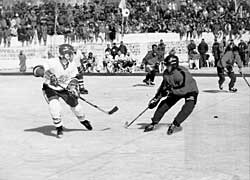 LEH, Ladakh-Once long ago, starvation and boredom were the hallmarks of winter in this remote, altitudinous place. A bad barley crop in summer meant that hunger stalked the cold months. The long, frigid nights drove people to bed early, after much chhang and raksi. The days were to be endured, women's fingers freezing in the still open streams as they washed cloths, warmed up later preparing food. Men headed for the boozer.
LEH, Ladakh-Once long ago, starvation and boredom were the hallmarks of winter in this remote, altitudinous place. A bad barley crop in summer meant that hunger stalked the cold months. The long, frigid nights drove people to bed early, after much chhang and raksi. The days were to be endured, women's fingers freezing in the still open streams as they washed cloths, warmed up later preparing food. Men headed for the boozer. Now Ladakh is a model of how to cope with the cold. For centuries, the winters have been the time for festivals. Before Buddhism, people languished in idleness. Afterward, they celebrated and partied and worshipped in a warming frenzy of faith and alcohol. As for food, the lowly potato has transformed life here in untold ways. No longer is roasted barley flour-the tsampa so beloved by Sherpas and Tibetans-a winter staple. Countless potato dishes grace the groaning boards of Ladakhi kitchens. For those who can afford it, theoretically daily flights from Delhi and elsewhere enliven the culinary experience with imports from the rest of the country. And then there's ice hockey.
That's right, ice hockey. The Canadians amongst you will nod knowingly at the allure of this antidote for freezing boredom, but the rest will need some explanation. Leh, the capital of Ladakh, is also the centre of Indian ice hockey. What better place for the beautiful game played on skates and frozen water than a high altitude desert region where the temperature rarely rises above 0 degrees Celsius between November and March. Invented in Canada-probably by British soldiers driven mad by the cold months-the game has spread to the chilly bits of Europe, Russia, Japan and even to warm places like Kuala Lumpur. And now India. The third annual National Ice Hockey Championships of India have just ended and it doesn't matter who won. In Leh, a good time was had by all.
I travelled on one of those theoretical flights (cancelled twice, made it just in time for the first game last Saturday) with a team of Canadians from Delhi. Two token Americans were also grudgingly allowed to join the squad, so long as they could endure the communal abuse and frequent jokes about George W hurled their way. They bore the burden well, perhaps because neither thought highly of President Bush and both were hockey players for America's northern reaches along the Canadian border. Almost Canadian, they were assured more than once. Ladakh pulled out all the stops to welcome the men from where the game began. Ladakhi hospitality and warmth were already legendary, but the shock of stepping off a flight from Delhi into minus 16 degrees-the spectacular scenery notwithstanding-took a lot of overcoming. The Ladakhis succeeded.
They also exacted their price. After tea and biscuits, the Canadians took to the ice of a frozen pond in the centre of Leh to play their first friendly game against a local squad. With an average age of around 40, and newly arrived from 250 metres above sea level to around 3,500, the North Americans were at somewhat of a disadvantage. But Ladakhis have played this game for just two years, whereas it's in the visitors' blood. Despite some huffing and puffing, the Canadians won. And each game brought roars of approval from a crowd that slowly built to 6,000 by the final day of the tournament. There were serious matches between local teams, and in the intervals everyone cheered on the Canadians, laughing if they fell and exclaiming at the innate prowess of unfit, ageing hockey players who'd known the game since childhood. "An inspiration," one man told me. "Great fun to watch and next year, we'll beat them," said the coach of the eventual champions, the Ladakh Scouts regiment of the Indian Army. But all that really mattered was the camaraderie, the fun and the constructive whiling away of wintry days that might otherwise be spent in boredom and bars. Between festivals, wintry Ladakh still has time on its hands.
It's an inspiration to see how sport-played for fun, not profit or national pride-can inspire such warmth and humanity. Now, if only we could build ice skating rinks in Namche or Jomsom. I know a team that's ready, willing and raring to come.



